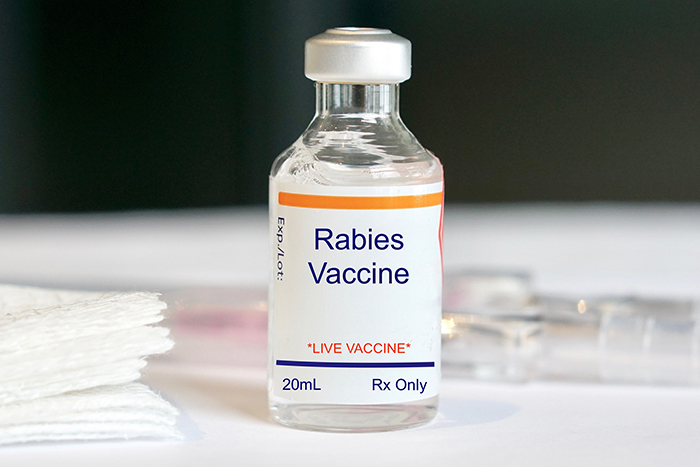Posted on
 Police in Groton, CT announced recently that a family dog in the area tested positive for rabies. Rabies has become rare in the US thanks to the rabies vaccine and public awareness, but this deadly disease is responsible for almost 60,000 human deaths worldwide every year.
Police in Groton, CT announced recently that a family dog in the area tested positive for rabies. Rabies has become rare in the US thanks to the rabies vaccine and public awareness, but this deadly disease is responsible for almost 60,000 human deaths worldwide every year.
Dr. Benjamin March, one of Pieper's primary care veterinarians, answered some questions for us about the dangers of rabies, and how we can help protect both our pets and our human families.
How can my pet contract rabies, and what dangers does it present?
Rabies is caused by a virus that can be transmitted through saliva via a wound (ex: bite, scratch) or via mucous membranes (ex: mouth, nose, eyes). It is typically transmitted through a bite or contact with an affected animal, though infection through inhalation of aerosolized virus may occur when exposed to bats, and infection can occur rarely after ingestion of an infected animal.
Rabies can spread from animals to people. There is no established cure or treatment for rabies in people or animals, and it is considered to be 100% fatal in those that contract it.
Why is the rabies vaccine mandatory by state law?
Rabies vaccinations in pet dogs and cats are a very important mechanism to protect people from potential exposure. Because dogs and cats are more likely to interact with infected animals (either outside or any that may enter the home), they can potentially be exposed to rabies and then subsequently expose a person.
In cases when a pet develops rabies, there is no treatment and the disease is always fatal. There are almost no other diseases – not even plague or Ebola – that carry this fatality rate.
Vaccination is a very easy, inexpensive means of protecting your pets from this universally fatal disease that, until relatively recently, was very common in the United States.
Do I still need to vaccinate my indoor-only pets against rabies?
Yes. Indoor-only pets can still be exposed to bats, rodents, and other animals that may make their way into the house. Also, pets do escape houses.
Are there any negative side effects from the rabies vaccine?
Vaccine side effects are very rare. The most common side effect, an allergic reaction, is easily treated with medications. Very rarely, anything that stimulates the immune system (such as a vaccine) can be associated with autoimmune disease. Tumors at injection sites do occur extremely rarely in a small subset of cats (1 in 10,000). To put it in perspective, the odds of being struck by lightning in your lifetime are estimated at about 1 in 3,000. In cats predisposed to injection site tumors, they can occur with any injection (ex: fluids, insulin), and are not specifically related just to vaccinations.
I’m not sure if my pet has a current rabies vaccination – what should I do?
Call your veterinarian and ask if your pet’s rabies vaccine is current. If not, we would recommend scheduling an appointment to get your pet updated as soon as possible.

Dr. Benjamin March has been with Pieper Veterinary since 2014. He graduated magna cum laude from the University of Connecticut, majoring in Animal Science and Pathobiology and minoring in Molecular and Cell Biology. Dr. March obtained his veterinary degree at Cornell University. While at Cornell, Dr. March was the recipient of the Frank Bloom Pathology Award, the Veterinary Cancer Society Award for Proficiency in Clinical Oncology, the Westminster Kennel Foundation Scholarship, and the Tracy French Clinical Pathology Award.
